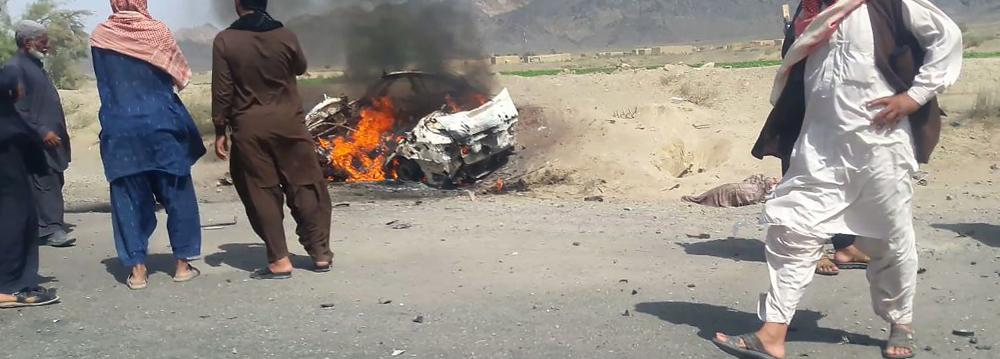The Afghan Taliban’s leadership council met on Sunday to start considering succession after a US drone strike in Pakistan targeted its commander, two Taliban sources told Reuters, in the strongest sign yet the insurgency had accepted he was dead.
The strike targeting Mullah Akhtar Mansour on Saturday was perhaps the most high-profile US incursion into Pakistan since the 2011 raid to kill Al-Qaeda leader Osama bin Laden and sparked a protest by Islamabad that its sovereignty had been violated.
US President Barack Obama confirmed on Monday that the leader of the Afghan Taliban had been killed in an American airstrike, an attack likely to trigger another leadership tussle in a militant movement already riven by internal divisions.
Obama, on a three-day visit to Vietnam, reiterated support for the government in Kabul and the Afghan security forces, calling on the Taliban to join peace talks.
The president authorized the drone strike that killed Mullah Akhtar Mansour in a remote region just on the Pakistani side of the border with Afghanistan on Saturday, and Afghan authorities have said the mission was successful.
But US officials held back from confirming that the Taliban leader had been killed in the attack until intelligence had been fully assessed.
Calling the death “an important milestone”, Obama said Mansour had rejected peace talks and had “continued to plot against and unleash attacks on American and Coalition forces”.
“The Taliban should seize the opportunity to pursue the only real path for ending this long conflict— joining the Afghan government in a reconciliation process that leads to lasting peace and stability,” he said.
However, Obama stressed that the operation against Mansour did not represent a shift in US strategy in Afghanistan or a return to active engagement in fighting following the end of the international coalition’s main combat mission in 2014.
The Taliban have not yet officially confirmed that Mansour was killed and there were conflicting accounts on Sunday.
Taliban sources said Sunday’s meeting of the Rahbari Shura, or leadership council, included discussion of possible successors, including guerrilla commander Sirajuddin Haqqani.
Haqqani, who has a $5 million US bounty on his head, would likely prove an even more implacable foe of Afghan government forces and their US allies.
He is widely seen by US and Afghan officials as the most dangerous warlord in the Taliban insurgency, responsible for the bloodiest attacks, including one last month in Kabul in which 64 people were killed.
“Based purely on matters of hierarchy, (Haqqani) would be the favorite to succeed Mansour,” said Michael Kugelman, a senior associate at the Woodrow Wilson Institute think tank.
The Taliban were also considering Mullah Mohammad Yaqoob, the son of Taliban founder Mullah Mohammad Omar, a potential unifier because of his father’s name. Former Guantanamo detainee Mullah Abdul Qayyum Zakir and Mullah Sherin were also cited, the sources said.
Pakistani Protests
The Saturday drone strike showed the United States was prepared to go after the Taliban leadership in Pakistan, which the government in Kabul has repeatedly accused of sheltering the insurgents.
Pakistan protested on Sunday, saying the US government did not inform Prime Minister Nawaz Sharif beforehand.
“This is a violation of Pakistan’s sovereignty,” Sharif told reporters in London, saying it was still unclear who was killed.
A US official, speaking on condition of anonymity, acknowledged that Washington only notified Pakistan after the operation. It was unclear how long Mansour might have been inside Pakistan before the US strike.
Mansour had failed to win over rival factions within the Taliban after formally assuming the helm last year after the Taliban admitted Mullah Omar had been dead for more than two years.
US Secretary of State John Kerry said the United States had conducted a precision air strike that targeted Mansour “in a remote area of the Afghanistan-Pakistan border”.
Mansour posed a “continuing, imminent threat” to US personnel and Afghans, Kerry told a news conference while on a visit to Myanmar.
“If people want to stand in the way of peace and continue to threaten and kill and blow people up, we have no recourse but to respond and I think we responded appropriately,” Kerry said.
Peace Talks
Efforts to broker talks between the Afghan government and the Taliban had already stalled after a suicide attack in Kabul last month that prompted President Ashraf Ghani to prioritize military operations over negotiations.
But Ghani’s office said on Sunday the removal of Mansour could open the door to talks and that Taliban members who wanted to end bloodshed should return from “alien soil” and join peace efforts.
US experts were less optimistic, cautioning against the idea that the shake-up would diminish the Taliban’s broader sense of strength, particularly given the uneven performance of US-backed Afghan forces last year and a pullback by Western troops.
“The Taliban have made considerable progress in Helmand (province) and elsewhere, so it’s hard to see much incentive for them to start compromising now,” a US intelligence official said on condition of anonymity.
One US government analyst said the Taliban were likely encouraged by the upcoming US presidential election.
“The Taliban, the Haqqanis, (Pakistani intelligence) and everyone else knows that ... the election this fall isn’t going to bring in someone who wants to send more American troops to retake territory the Afghans are losing,” the analyst said.


